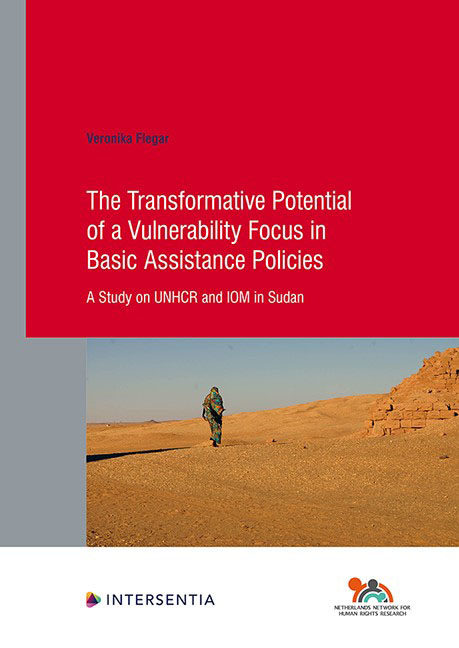 The Transformative Potential of a Vulnerability Focus in Basic Assistance Policies
The Transformative Potential of a Vulnerability Focus in Basic Assistance Policies Book contents
- Frontmatter
- Dedication
- Preface and Acknowledgements
- Contents
- List of Abbreviations
- List of Tables
- List of Figures
- Chapter 1 Introduction
- PART I NORMATIVE AND EMPIRICAL THEORY
- PART II BACKGROUND TO THE CASE STUDIES
- PART III CASE 1: ASSESSING AND ADDRESSING VULNERABILITY AT UNHCR KHARTOUM
- PART IV CASE 2: ASSESSING AND ADDRESSING VULNERABILITY AT IOM KHARTOUM
- PART V
- Bibliography
- Samenvatting
- Summary
- About the Author
- Human Rights Research Series
Chapter 3 - Themes and Concepts Relevant to the Case Studies
Published online by Cambridge University Press: 11 November 2021
- Frontmatter
- Dedication
- Preface and Acknowledgements
- Contents
- List of Abbreviations
- List of Tables
- List of Figures
- Chapter 1 Introduction
- PART I NORMATIVE AND EMPIRICAL THEORY
- PART II BACKGROUND TO THE CASE STUDIES
- PART III CASE 1: ASSESSING AND ADDRESSING VULNERABILITY AT UNHCR KHARTOUM
- PART IV CASE 2: ASSESSING AND ADDRESSING VULNERABILITY AT IOM KHARTOUM
- PART V
- Bibliography
- Samenvatting
- Summary
- About the Author
- Human Rights Research Series
Summary
This chapter provides an overview of the themes and concepts that are relevant for understanding the two case studies. These themes and concepts were not relied upon from the start but, in line with Corbin and Strauss’ grounded theory method, emerged gradually as the data collection and analysis of the first case study progressed. Yet, they are outlined here because they form the backbone and structure of the case studies and presenting them upfront is meant to serve as a guide to the reader.
The chapter is largely written in the first person to underline the following point: an empirical social phenomenon can usually be understood on the basis of several legitimate alternative theories and explanations and a single, definitive connection of empirical observations to theory remains elusive. Theories in the social sciences and humanities are thus “resources of semiotic mediation” which “not only reflect the world in the mind's eye” but also “(re)construct it according to our pragmatic interests”. The choice in this respect depends on the extent to which the researcher perceives a theory as relevant to the issue at stake.
The issue at stake in this study, i.e. the main research question, is how the vulnerability focus in basic assistance policies by UNHCR and IOM in Khartoum (Sudan) contribute to the vulnerability notion's alleged transformative potential for the realisation of universal human rights. With this in mind, I developed three themes that are further distinguished into a number of concepts and codes. These themes, concepts and codes emerged from the data and were employed to structure and interpret the findings so as to make sense of the case studies in a way that would facilitate an answer to the main research question. I developed these themes, concepts and codes on the basis of a combination of three considerations:
– The Data: what I encountered in the desk research, during participant observation and in the interviews with basic assistance providers at UNHCR and IOM in Khartoum;
– The Literature: what I had read on UNHCR and IOM in humanitarian governance literature, on vulnerability assessments for basic assistance in public administration literature and on addressing vulnerability in social work literature.
- Type
- Chapter
- Information
- The Transformative Potential of a Vulnerability Focus in Basic Assistance PoliciesA Study on UNHCR and IOM in Sudan, pp. 45 - 64Publisher: IntersentiaPrint publication year: 2020


